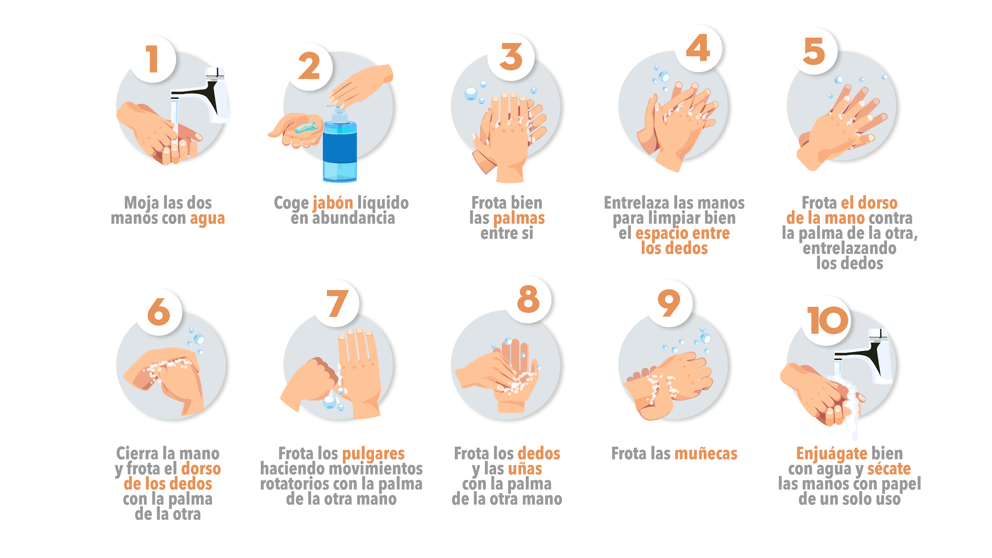

Given the current situation caused by the COVID-19 emergency, and in recognition of the fundamental role played by Spanish Food Trucks in the food, health and social crisis, the following post summarises the recommendations for preventing the spread of this disease, taking into account the hygiene standards that usually apply to areas where food is prepared, in addition to the actions related to preventing the spread of the virus, as indicated by the Spanish Ministry of Health.
Although it is known that no study carried out to date suggests that COVID-19 can be transmitted through food, as it is a disease that is mainly transmitted through the respiratory tract, it is essential to protect the health of cooks when carrying out their tasks inside the food truck and to prevent possible contagion between them and the families who come in search of your preparations.
For this purpose, it is recommended to follow the following protocol and to turn to reliable sources of information and assistance in case any doubts arise or if the indications presented here are not entirely clear or applicable.
General precautions for COVID-19 prevention in Food Trucks
The virus is known to be transmitted from person to person or by contact with surfaces. In this regard, it should be noted that the virus can live on surfaces that are widely used in the kitchens of your food truck trailers.
It is therefore very important to take the utmost hygiene measures, both for the staff and the processing area (worktops, kitchen appliances, utensils, door handles, etc.). In order to comply with each of the recommendations for prevention, it is essential to optimise the organisation of work tasks, definition of roles and responsibilities in your fast food trailer.
Personal hygiene
- Everyone involved and responsible for the tasks performed in the food truck must be aware of the detection of the symptoms of the disease.
- All people involved in food processing must be healthy.
- Wear clean and exclusive clothing for food processing. A transparent cap and face mask ("mouth cover") should be worn throughout the food processing process.
- Wash hands with soap and water before, during and after processing and dry hands with disposable paper towels. This is one of the key practices to prevent the spread of the virus.
- Avoid touching your eyes, nose and mouth with your hands. If you do, clean your hands again.
- Do not greet other people by kissing, hugging or shaking hands.
- Do not use the same utensils between colleagues and if you have to do so, wash them with detergent and water between the use of different people. It is recommended to disinfect everything at the end of the day. Sneezing and/or coughing into the crook of the elbow, if hands are accidentally used for covering, they should be washed and disinfected immediately.
- If necessary, use disposable tissues and dispose of them immediately in the waste bin.
It is recommended that food truck workers know how to recognise symptoms and pay attention to them, even if they are mild.
Considerations for the processing site
- A damp cloth with bleach for disinfecting the soles of shoes should be available at all times at the entrance to the cooking area.
- If possible, there should be a place to leave "street" clothes and change into clothes exclusively for kitchen work.
- As the space in the mobile food truck caravan is very limited, it is recommended to take turns to minimise the number of people in contact with each other.
- All contact surfaces (worktops, shelves) and utensils should be washed with detergent.
- Pantries, cupboards or any place used for storage should be washed and disinfected on a daily basis.
- Have cleaning products available for workers and facilities: For workers: liquid soap and blotting paper. Cloth towels for drying hands and bar soaps should not be used. If possible, have a supply of alcohol gel or alcohol diluted in water at a ratio of 70/30 for use after hand washing.
- For facilities: water, detergent and bleach.
- Adopt simple and clear protocols and establish cleaning and disinfection frequencies for facilities, floors, surfaces, utensils and personnel. Within the facilities, consideration should be given to handles and knobs on drawers and cupboards.
- Items used for cleaning should be kept clean and in good condition, otherwise they should be discarded.
- The fast food trailer should be ventilated frequently, taking precautions to avoid contamination of food by dirt entering the kitchen from outside (e.g. wind and dust from the street). At the end of a cooking shift ensure that the kitchen is cleaned and disinfected.
